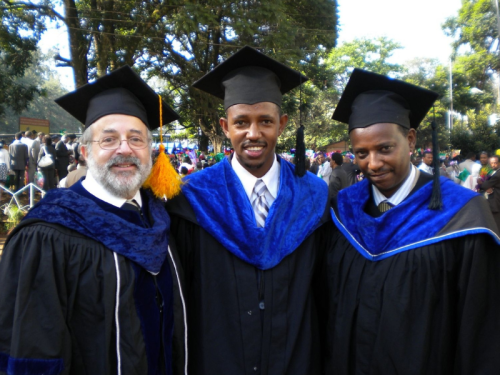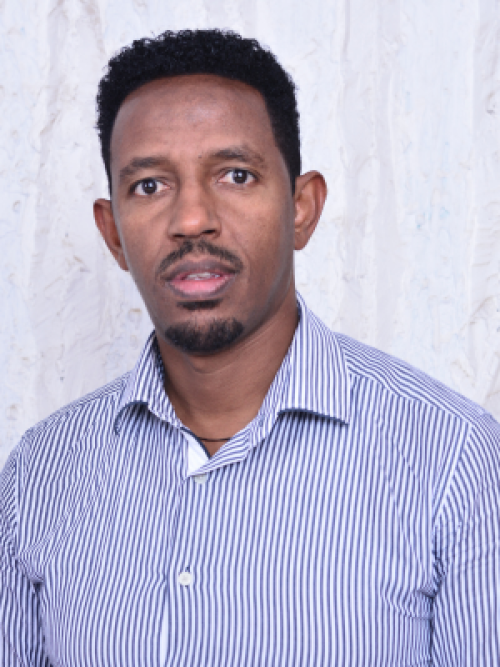Alumnus demonstrates sustainability in action

One of the central tenets of the Tulane University School of Public Health and Tropical Medicine’s global health work is capacity building. Rather than bring in professionals to “fix” a problem in a resource-limited country, it’s a much better practice to build capacity from within the country.
Such is the case in Ethiopia. Starting in 2006, SPHTM worked with the University Technical Assistance Program of the Centers for Disease Control and Prevention to develop training curricula to expand Ethiopia’s growing health workforce. In particular, Dr. Carl Kendall, professor of social, behavioral, and population sciences, worked with Jimma University, one of the oldest public universities in Ethiopia, to establish the International Center for Monitoring and Evaluation.
Yibeltal K. Alemayehu was one of the first students to benefit from this partnership. He graduated from Jimma with a Master of Science in Health Monitoring and Evaluation in 2008. Alemayehu was not done with his connection to Tulane, however.
Six years later, he embarked on a doctoral degree, this time on campus at Tulane in what was then called the Department of Global Community Health and Behavioral Sciences. That degree and the work he has done since have more than realized the goal of “capacity building” in his home country of Ethiopia.
Alemayehu currently serves as assistant professor in the Department of Health Policy and Management at Jimma University, where he teaches health systems research methods and program evaluation. He also serves as chief executive officer for MERQ, a consultancy in Ethiopia dedicated to monitoring, evaluation, research, and quality improvement (which forms the company initialism). He leads research projects that create private sector-led opportunities for university scholars to apply what they teach.
In his role at MERQ, Alemayehu has participated in a number of national-level activities that are making a difference in the health of everyday Ethiopians. His effort to promote “Utilization-focused” approaches in his research and evaluation projects has contributed to the use of evidence to inform policy and programming decisions in the Ethiopian health sector. His contributions as a health systems researcher and program evaluator span across a range of topics including primary health care service delivery, human resource for health, community-based health insurance, health information systems, and community engagement.

For one initiative, Alemayehu provided technical leadership to evaluate Ethiopia’s Health Extension Program, a flagship national program introduced in 2003. MERQ’s role was to determine if, after fifteen years, the program was still contributing to health and development in the country and what changes would be required to keep it relevant. Through engagement with government stakeholders and key partners, Alemayehu’s work provided a roadmap for the next fifteen years to guide how the program should evolve.
Another major undertaking that he has been involved in has been a national evaluation of a new financing scheme for health insurance in Ethiopia. “Health insurance is new for Ethiopians,” says Alemayehu. Ethiopia instituted a pilot program then scaled up a community-based health insurance (CBHI) scheme. CBHI schemes are usually voluntary, coordinated at the district level, and characterized by community members pooling funds to offset the cost of healthcare.
It had become clear that not enough people were enrolling in the CBHI. Alemayehu, in collaboration with colleagues at MERQ, University scholars, and Dr. David Hotchkiss, chair of the Department of International Health and Sustainable Development, conducted a comprehensive, national-level impact assessment using household data to determine how the CBHI impacted use of outpatient health services and the costs incurred by both scheme members and non-members.
The research demonstrated that the CBHI helped members avoid catastrophic health expenditures and made participants more likely to use health services. The data were published in BMC Health Services Research and can be used for decision-making going forward.
Currently, Alemayehu is principal investigator on two projects financed by the Bill & Melinda Gates Foundation, one providing implementation research on primary health care and another that is a human resource for health modeling project on health extension workers. The implementation research project represents a $2.5 million investment over a period of five years, intended to generate valid and credible evidence on the operational feasibility, effectiveness, and sustainability of strategies to improve primary health care service delivery in Ethiopia, and to facilitate the translation of learnings from the field to policy making and programming in the Ethiopian health sector.
Alemayehu and his colleagues at MERQ are collaborating with the Ministry of Health of Ethiopia, Vital Wave and the Institute for Disease Modeling on the modeling project to use the findings of a time and motion study for developing a model for predicting and forecasting workload and workforce needs among health posts in Ethiopia.
Alemayehu says that MERQ is shifting its role from one where they provide a service to a relationship where they work closely with program implementers and policymakers to use assessments to make iterative decisions. In one exciting program that he directed, MERQ has served as a learning partner for a consortium of organizations responsible for implementing city-level projects designed to empower young people.
“There is nothing more that makes you happier than seeing the evidence that you invested your time, your people, everything to inform it,” says Alemayehu. “That’s a really fantastic achievement for me.”
While MERQ keeps Alemayehu busy, he still finds time to do his own capacity building as an assistant professor at Jimma University, the same institution where he earned his master’s degree and first became connected to Tulane.
“Tulane truly has a special space in my career.” he says. “You can see how much Tulane has actually contributed in my life. I’m really grateful to Tulane and all the professors from whom I learned teaching skills and subject matter.”
“Combining practice with research with teaching was something that used to be my dream,” Alemayehu added. “It seems my dream is coming to real life.”
